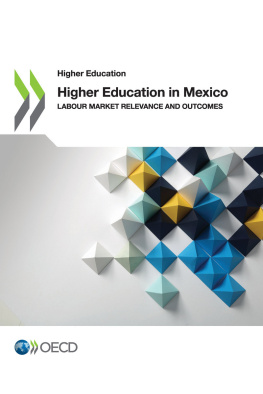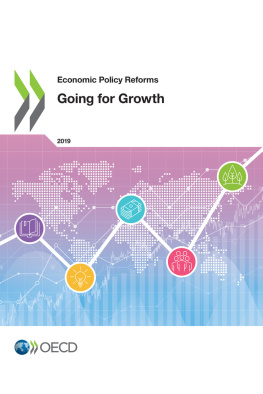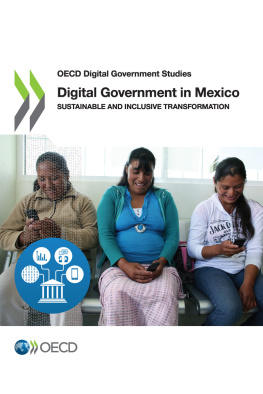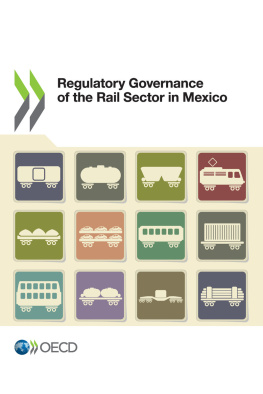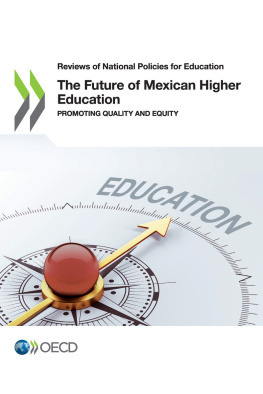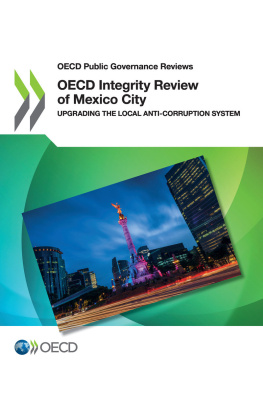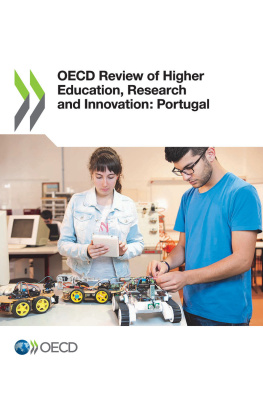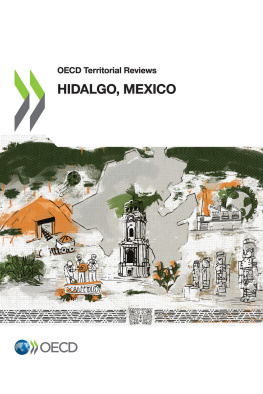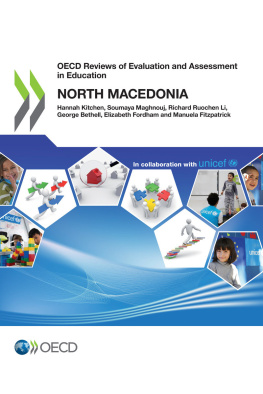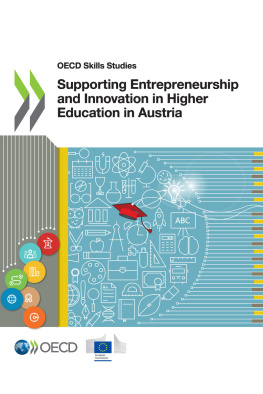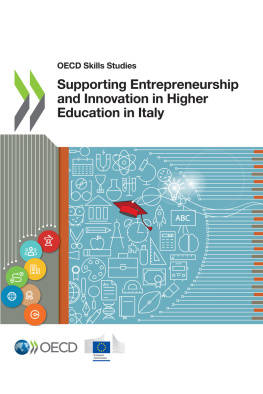OECD - Higher Education in Mexico
Here you can read online OECD - Higher Education in Mexico full text of the book (entire story) in english for free. Download pdf and epub, get meaning, cover and reviews about this ebook. year: 2019, publisher: OECD Publishing, genre: Romance novel. Description of the work, (preface) as well as reviews are available. Best literature library LitArk.com created for fans of good reading and offers a wide selection of genres:
Romance novel
Science fiction
Adventure
Detective
Science
History
Home and family
Prose
Art
Politics
Computer
Non-fiction
Religion
Business
Children
Humor
Choose a favorite category and find really read worthwhile books. Enjoy immersion in the world of imagination, feel the emotions of the characters or learn something new for yourself, make an fascinating discovery.
- Book:Higher Education in Mexico
- Author:
- Publisher:OECD Publishing
- Genre:
- Year:2019
- Rating:5 / 5
- Favourites:Add to favourites
- Your mark:
- 100
- 1
- 2
- 3
- 4
- 5
Higher Education in Mexico: summary, description and annotation
We offer to read an annotation, description, summary or preface (depends on what the author of the book "Higher Education in Mexico" wrote himself). If you haven't found the necessary information about the book — write in the comments, we will try to find it.
OECD: author's other books
Who wrote Higher Education in Mexico? Find out the surname, the name of the author of the book and a list of all author's works by series.
Higher Education in Mexico — read online for free the complete book (whole text) full work
Below is the text of the book, divided by pages. System saving the place of the last page read, allows you to conveniently read the book "Higher Education in Mexico" online for free, without having to search again every time where you left off. Put a bookmark, and you can go to the page where you finished reading at any time.
Font size:
Interval:
Bookmark:
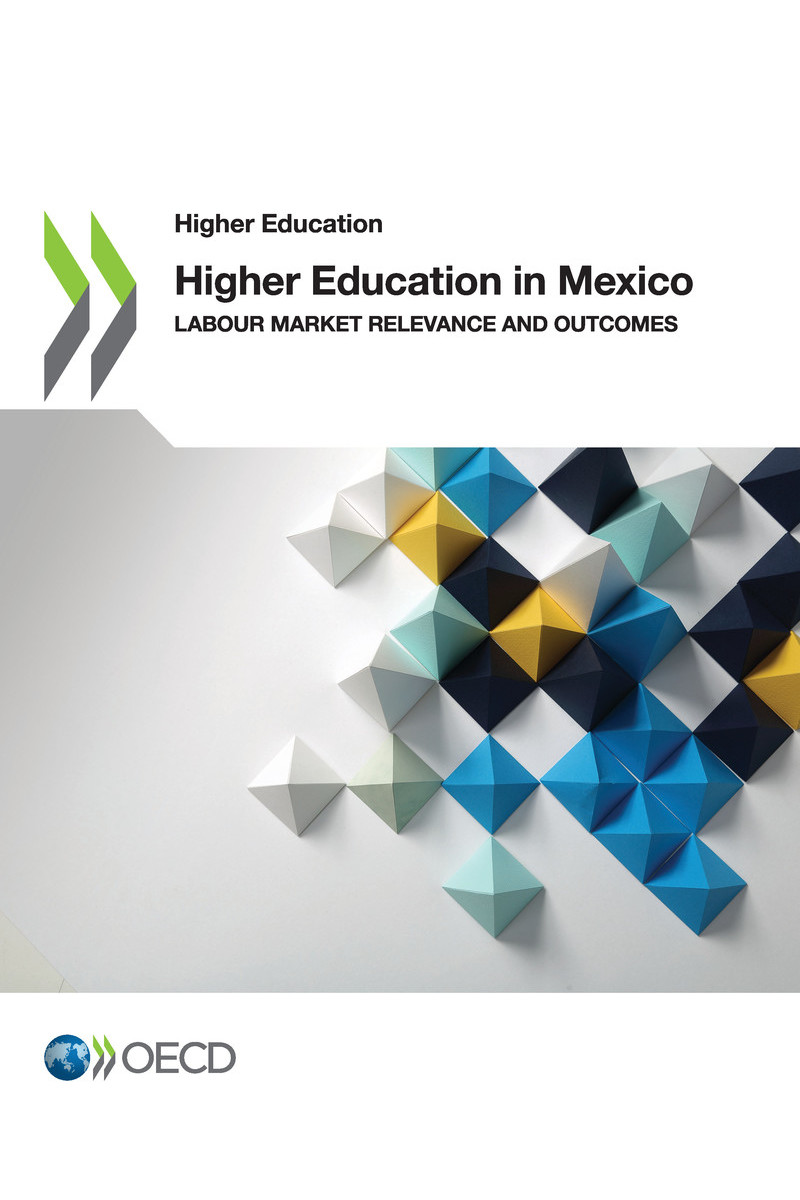
OECD (2019), Higher Education in Mexico: Labour Market Relevance and Outcomes , Higher Education, OECD Publishing, Paris.
https://doi.org/10.1787/9789264309432-en
Over the last decade, the number of students in higher education in Mexico has doubled, and more than half a million graduates enter the labour market every year. Finding adequate employment is difficult and too many young graduates work in occupations for which they are overqualified, or end up in jobs without social security or pension coverage.
Mexico is not alone in this situation. In many OECD countries, weaker-than-expected outcomes of higher education are a disappointment for graduates and their families, who expect good quality and well-paying jobs as a return on their investment in education. Weak returns are also a concern for governments, who invest in the development of skills to boost national and regional productivity and innovation.
In responding to these concerns, the OECD is undertaking an in-depth analysis of the labour market relevance and outcomes of higher education systems. The aim is to help countries improve policies and institutional practices through a better understanding of enablers and barriers, and through recommendations that help close gaps. Mexico was one of the first countries to join this exercise, together with Norway and the United States.
Three aspects stand out from the analysis and make this report a relevant read for policy makers and higher education stakeholders. First, Mexicos higher education system is large and complex, but it lacks diversity of fields and levels of study to match labour market needs. Quality assurance has developed in the last decade but is still voluntary, fragmented, unclear and overlapping.
Second, students need better support to succeed. Pockets of innovative approaches to learning and teaching exist, but are not common practice. Smaller institutions lack the resources and connections to organise effective engagement with employers and work-based learning. Social service, which every undergraduate needs to complete before graduating, is a commendable practice of giving back to society, and potentially a very effective way to develop transversal skills. However, as this analysis shows, initiatives such as these need to be well regulated and managed. Students, who in many cases need to combine work and studies, need more flexibility and the ability to exit and return to higher education at a later stage in life to complete or continue studies at an advanced level.
Finally, in Mexico, as in other OECD countries, strengthening the connections between higher education and the labour market calls for a whole-of-government approach and the involvement of all higher education stakeholders. Mexico needs better connected, up-to-date information and projections of future labour market needs to allow institutions, students and employers make better choices and plan ahead.
Promising steps in all of these areas have been made, and the OECD is ready to support Mexico in going forward.
This report is part of a series of country reviews developed for the in-depth analysis of the labour market relevance and outcomes of higher education strand of work as part of the OECDs Enhancing Higher Education System Performance project.
The work was carried out in close collaboration with the companion report, The Future of Mexican Higher Education: Promoting Quality and Equity , which focuses on broader issues in higher education, including governance, funding, quality and equity, as well as two key sectors of higher education: teacher education colleges and professional and technical institutions.
The OECD would like to thank the Mexican Secretariat of Public Education ( Secretaria de Educacin Pblica, SEP), under the leadership of Rodolfo Tuirn Gutierrez, Vice-Minister of Higher Education, for its continued support of the project. In particular, the OECD would like to express its gratitude to Salvador Malo, Director General for University Higher Education, for acting as the national co-ordinator for the project. His support, input, and feedback throughout the project was invaluable.
The OECD is also grateful to the National Council for the Accreditation of Higher Education ( Consejo para la Acreditacin de la Educacin Superior , COPAES) for coordinating the project in Mexico. The OECD is especially thankful to Vicente Lpez Portillo Tostado, Director General of COPAES, for his leadership and ability to bring key stakeholders into the project. The OECD would also like to thank members of the COPAES leadership team: Isabel Almada Calvo, Juan Carlos Del Castillo Vzquez, Gerardo de Jess Villavicencio Obregn, and Pedro Mara Salcedo for their assistance during the country review visit to Mexico and for helping to foster a strong understanding of the higher education system and policy issues in Mexico. The OECD is also thankful to Gabriela Esteva and the team of ESMART Consultores for the compilation of the country background information and their support during the project.
The OECD would also like to recognise the supportive role played by the Permanent Representative of Mexico to the OECD, Ambassador Mnica Aspe, and her staff, in facilitating contacts and information gathering in Mexico.
This report benefitted immensely from interviews conducted with government ministries, public agencies and higher education stakeholders from 30 January to 1 February 2018 in Mexico City and the videoconferences in the following months. The OECD would like to thank the following organisations for the critical knowledge and perspectives provided during the interviews: the Secretariat of Labour and Social Welfare (STPS) through the Sub-secretariat of Employment and Competitiveness; the Secretariat of Economy (SE) through the Sub-secretariat of Industry and Trade; the National Institute of Statistics and Geography (INEGI); the National Association of Universities and Higher Education Institutions (ANUIES); the Federation of Mexican Private Higher Education Institutions (FIMPES); the National Productivity Committee (CNP); the National Technological Institute of Mexico (TecNM); the General Coordination of Technological and Polytechnic Universities (CGUTyP); the National Science and Technology Council (CONACyT); the National Council for Standardisation and Certification of Labour Competencies (CONOCER); the National Centre for Higher Education Assessment (CENEVAL), the Business Co-ordinating Council (CCE); the Confederation of Workers in Mexico (CTM); the Confederation of Employers (COPARMEX); the Mexican Institute for Competitiveness (IMCO); the Higher Education-Industry Foundation (FESE); Exponential Mxico; Valle de Mxico University (UVM); Anhuac University; School of Banking and Commerce (EBC); Kimberly-Clark; Cryoinfra; Grupo BAL; the National Autonomous University of Mexico (UNAM); the National Polytechnic Institute (IPN); the Autonomous University of Puebla (BUAP); and the University of Guadalajara (UdG).
Font size:
Interval:
Bookmark:
Similar books «Higher Education in Mexico»
Look at similar books to Higher Education in Mexico. We have selected literature similar in name and meaning in the hope of providing readers with more options to find new, interesting, not yet read works.
Discussion, reviews of the book Higher Education in Mexico and just readers' own opinions. Leave your comments, write what you think about the work, its meaning or the main characters. Specify what exactly you liked and what you didn't like, and why you think so.

